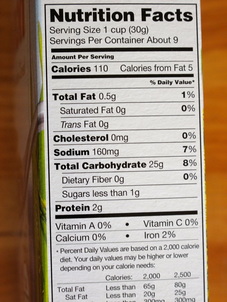
We are culturally wired for things to be easy. When they are not easy, we give up, instead seeking something else that can give us instant satisfaction. Counting calories consumed plays right into this need for ease. It is formulaic: in our minds numbers don't lie, and we can do it quickly.
However, and this is huge so write it down: Calories in do not equal calories out.
Why?
You can be on a 1,200 calorie a day diet, well below the amount of calories a 5'5", 140 pound woman needs to maintain her weight, and still gain weight. That's right, you can calorie restrict and still gain weight.
What you eat matters more than the calories contained in the food you are eating.
If you have a healthy amount of fat in your diet, from good sources like olive oil and avocados, you will be more satiated and less likely to overeat. If you eat a lot of carbohydrates, which have less calories than fat, you will step on the sugar bandwagon, be hungry again more quickly, and will store fat. Our addiction to certain foods, especially sugars and processed carbohydrates, leads to a cycle of eating, brain-centered pleasure, withdrawal, cravings, and overeating. I say brain-centered pleasure because rarely do these foods actually make your body feel good. You are more likely to overeat when your diet consists mostly of carbohydrates in the form of processed foods, sugar, and refined grains.
Cutting and/or counting calories doesn't actually address what's causing you to hold on to weight or the inability to lose weight. I know this first hand. Sometimes, the reason you can't lose weight is because your body is inflamed. This was the case for me. As soon as I eliminated gluten from my diet, but did not change my daily caloric intake, I lost four pounds in two weeks. This was entirely due to cutting out a food that was making me sick.
In addition to undetected food intolerances, your body will hold onto weight for a variety of reasons. These include poor sleep patterns, inefficient digestion, and lack of exercise/movement.
Counting calories also can wreck your metabolism. Once you start counting your calories and restricting your food, your incredibly smart body catches on and slows down your metabolism accordingly. Not only that, the longer you restrict your calories, the more likely you are to burn muscle. You get frustrated, decide calorie restriction isn't working, and go back to eating what you did before you were counting calories, except now you are gaining weight. Why? Your metabolism is stuck in the slow mode it entered when you were calorie restricting.
What is the answer?
When your eating is centered around whole foods, with lots of greens, good fats, and nutrient dense foods, then counting calories becomes obsolete. Your body finds a balance that allows it to function efficiently where your metabolism is calibrated for you, so you are burning fat as needed, so your hunger is based on actually being hungry rather than the brain being addicted to sugar, and so you have energy and feel good.
The other night, I had the pleasure of hearing Sonia Diaz-Ebadi, a therapist in Santa Barbara, talk about what changed her relationship with food. For her, the shift, learned through working with Melanie Elkin* of Yoga'licious, was to ask herself, "How do I want to feel after I eat this?" instead of "What do I feel like eating?" The latter question comes from the brain, a brain that is likely motivated by instant gratification, and quite possibly sugar addiction. The former question comes from the body. What would make my body feel good? How do I want my body to feel? Ask yourself this and see if your relationship with food shifts.
*Full disclosure: Melanie Elkin is also my coach.


 RSS Feed
RSS Feed